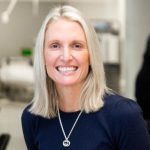
Dr Prunella Blinman
Ensuring that medical oncology embraces diversity is a key priority for the new chair of the Medical Oncology Group of Australia (MOGA) Dr Prunella Blinman.
Speaking at the MOGA 2019 ASM in Canberra, Dr Blinman said the group had a duty to represent all Australians regardless of gender, race, and geographical location.
“My personal mission is for MOGA to continue embracing diversity – and that’s for the benefit of patients with cancer because ultimately we believe that will lead to better patient care,” she said.
She presented figures at the meeting showing that 61% of MOGA’s 504 clinician members are male, and 24 of the 46 new MOGA fellows in 2015 were female. But while more than 50% of vocational trainees in medical oncology are female, there are still many areas of gender bias in oncology that need addressing, said Dr Blinman, a medical oncologist at the Concord Cancer Centre, Sydney.
She cited a recent analysis of gender diversity at the ASCO meeting, where 60% of speakers were male, and female presenters were more likely to be introduced by their first name only whereas male speakers were more likely to receive a professional address. There were also many areas of unconscious gender bias in medical oncology, such as comments about appearance, or female trainees being more likely to go on to work part-time, she told the meeting.
Like most other medical professional organisations, MOGA has developed a diversity policy that will cover MOGA membership and committees and also MOGA-sponsored events and meetings to ensure there is balance in speaker selection and to avoid male-dominated panels, said Dr Blinman.
“The diversity policy focuses on the spectrum of characteristics of the membership with regard to gender, age, fellow status, state of residence, remoteness and cultural heritage.
“This is now ready to go and you’ll be hearing more about this from us soon.”
“In embracing diversity we embrace our differences, we support each other and we strengthen MOGA and in doing so we provide the best care to our patients.”
Speaking to the limbic, Dr Blinman said that in her new role she also hoped to build on the achievements of previous MOGA chair Dr Chris Karapetis in ensuring the group is the leader in advocacy for medical oncology.
MOGA is now recognised as the ‘go-to’ organisation for the views of medical oncologists on issues such as the recent chemotherapy under-dosing cases and advocating for access to new therapies, she said.
“There’s often a big divide between what we want to do, what we know works based on evidence and what is reimbursed – for example with genomic testing where we don’t have universal access in cancers where that is really important such as lung cancer.
“We’ve worked hard to establish relationships with the PBAC to push for equitable access to drugs, because it takes a very long time to get [PBS] approval and we certainly lag behind the rest of the world in doing that,” she said.
“We also have the MBS item review hanging over our heads – it is proposing major changes and is taking a lot longer than expected. And there’s a lot of uncertainty about how that is going to evolve,” said Dr Blinman.
Other challenges facing MOGA included workforce issues, she said, with an increasing number of trainees not being matched by consultant jobs in hospitals. And the personal health of medical oncologists would be another priority for the new MOGA chair.
“We certainly need to look after ourselves as physicians. Oncology is a very demanding job and you can’t sustain the emotional burden of the job without some diversion or break. There is growing recognition that self-care has a key role part of our working life – and we need protected time to do that. That’s a challenge.”